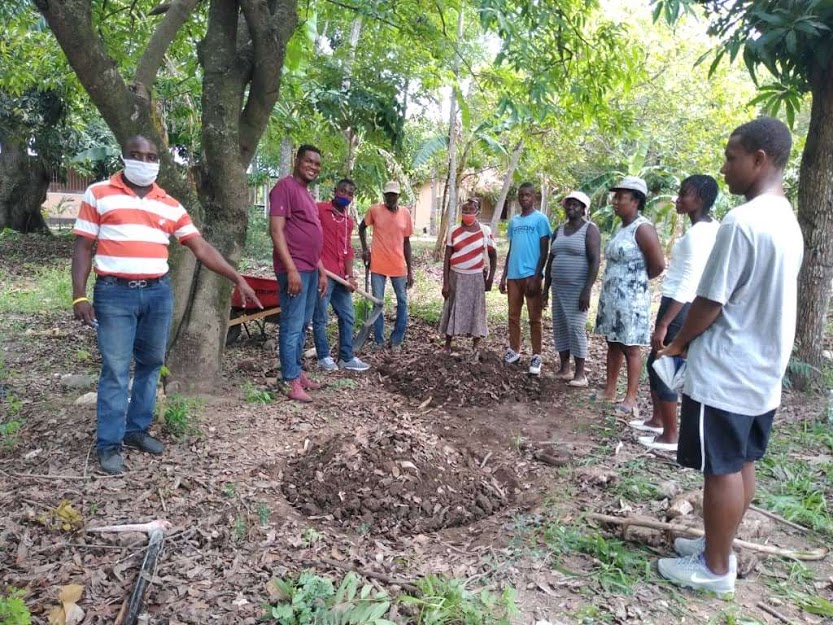
[Editor's note: The update below comes before the full scope of Tropical Storm Laura's damage is known, though local impacts in the Gros Morne area were not severe. Nationally, La Nouvelliste reports 9 people have died and many are without power and/or have been left homeless in the wake of the storm. It is too early to know the longer-term impact of flooding on the upcoming harvest. We will have a further update as we learn more details.]
After more than 5 months at home, students began a staggered return to the classrooms of Gros Morne in mid-August. The latest academic calendar calls for about 50 days of instruction, to somehow cobble together what the students have missed after more than 100 days out of the classroom, and then final exams in mid-October. It is by no means a perfect, or even adequate, system, but people are managing as best they can in order to salvage the academic year. While the students were out of the classroom, Lekol Jezi-Mari and St Gabriel's School in partnership with Mercy Beyond Borders kept students engaged by broadcasting lessons on local radio stations. The radio signal reaches into the mountains of the 8 communal sections of Gros Morne, so even students who were sent to stay with family members in the countryside could continue with their lessons, to some extent.
These plans for a truncated academic year are happening against the backdrop of what is proving to be an active hurricane season. The first few storms to graze Gros Morne brought rain and strong winds, but thankfully no more serious damage than uprooted gardens so far. Hurricane Isaias uprooted avocado and plantain trees out in the communal sections, and Laura uprooted the corn crop in some areas of the Gros Morne region. Farmers lament the loss of their gardens so close to the big summer harvest, since for the majority of families in Gros Morne, "working remotely" means working in the countryside in their family gardens. A good harvest enables them to send their children to school and put food on the table. Without a harvest of any kind, their families will suffer from hunger and will remain stuck in the cycle of generational poverty with no way forward. But thanks to support from the agronomy team, farmers are able to have some hope for the next planting season with good quality subsidized seeds provided by the local seed bank. This is made possible by partners like Quixote Center and Mercy Focus on Haiti, which enabled the Grepen agronomy team to purchase seeds to assist farmers in all 8 of the communal sections throughout the spring and summer planting season. This vital support enabled farmers to have hope amidst all of the economic uncertainty caused by the pandemic, and now gives them hope again after the destruction of their gardens during the tropical storms.
Public hand-washing stations remain well-utilized around Gros Morne, and schools that did not previously have hand-washing stations rigged up their own, in preparation for the return of students. People wear masks when required, in order to enter schools, banks, and churches, but mask-wearing in the local open air market and on the streets in general has been sporadic. Churches officially reopened in mid-July, but funerals have been held throughout the pandemic, with increasing frequency, it seems. Many people have had coronavirus symptoms, but testing capacity to confirm whether they actually have covid-19 is lacking. There is a natural tea which seems to provide relief from the symptoms of coronavirus, which is how the majority of people locally are coping with this illness.
The borders of Haiti reopened at the end of July, but the exchange rate has ballooned to an abysmal 125 HTG to 1 USD. As salaries remain fixed, families struggle to respond to their decreasing purchasing power. Basic provisions of rice, beans, and oil for a family of 6 for the month now cost about the equivalent of $50 USD, which is unsustainable for the majority of families. Teachers in some departments have begun to strike as they demand a living wage, yet another legitimate concern and stumbling block for this plan to salvage the school year.
The lack of economic activity is causing old grievances to explode in one communal section in particular. Out in the far reaches of the mountains of the Pendus area, houses have been burned and people shot, as an old feud heats up amidst the desperation and despair that so many are feeling as the pandemic continues to negatively impact economic opportunities. Many young people from Gros Morne who were working or studying at university or technical school in the larger cities of Gonaives, Port-de-Paix, and Port-au-Prince returned home to the countryside where things seemed more stable during the crisis point of the pandemic, and these students have slowly begun to return to the cities in search of a way forward as schools reopen. Young people returned in droves from the Dominican Republic as well, since coronavirus prevention measures blocked the majority of them from continuing to work or study there. Now they wait to see what opportunities will present themselves, but as coronavirus cases fluctuate and tropical storms blow, the winds of change haven't yet come to relieve people from the grasp of the economic downturn caused by the pandemic.


Comments
VIVIAN MARIE PA... (not verified)
Gerri, THANK YOU FOR USING YOUR GIFT OF WRITING IN SUCH A WAY THAT READING YOUR ARTICLE MAKES ME FEEL THAT I AM BACK IN GROS-MORNE!
OH! I HOLD ALL THE PEOPLE AND THEIR SUFFERING IN MY PRAYER!
bOD BLESS YOU,
sR. vIVIAN, RJM